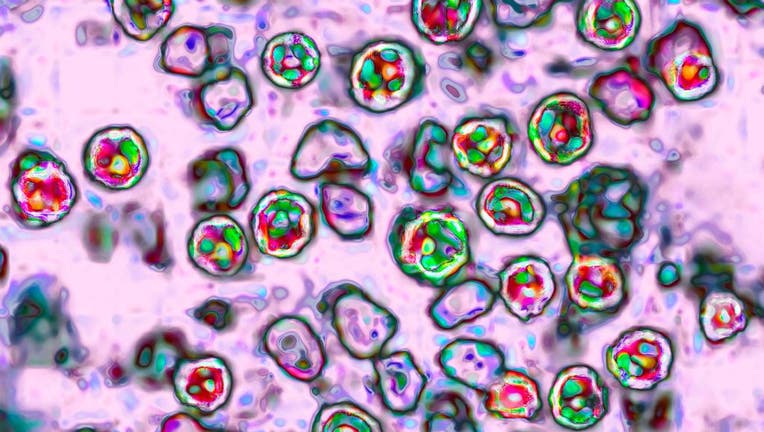Fifth measles case confirmed in Georgia | What we know

The measles virus, paramyxoviridae from the Morbillivirus family, transmission microscopy view. (Photo by: BSIP/Universal Images Group via Getty Images)
Georgia health officials have confirmed a fifth case of measles in the state.
The Georgia Department of Public Health tells FOX 5 that the new case is connected with a previous positive case reported in metro Atlanta.
What we know:
According to the Georgia DPH, the person who tested positive is a family member of the previous case, which was confirmed in May.
The primary case was an unvaccinated metro Atlanta resident who caught it while traveling internationally, officials said.
Officials are now working to find anyone who had contact with the individual who recently tested positive.
Last year, there were six cases of measles in Georgia.
What we don't know:
Authorities have not shared any identifying information about the new individual, including what part of metro Atlanta they may live in.
What is measles?
Dig deeper:
Measles is a highly contagious virus that spreads through the air when an infected person coughs or sneezes. According to the Centers for Disease Control and Prevention (CDC), the virus can linger in the air or on surfaces for up to two hours after the infected individual has left the area. Symptoms typically appear between seven and 14 days after exposure and often begin with a high fever, cough, runny nose, and watery eyes. A rash of small, red spots usually follows, starting at the head and spreading across the body. Health experts emphasize that the measles, mumps, and rubella (MMR) vaccine remains the most effective defense against infection. The CDC recommends children receive the first dose of the MMR vaccine between 12 and 15 months of age, followed by a second dose between 4 and 6 years old. A single dose of the vaccine provides immunity to over 95% of recipients, while the second dose increases protection to about 98%.
Anyone experiencing symptoms consistent with measles should contact their healthcare provider immediately. However, officials strongly advise calling ahead before visiting a doctor’s office, hospital, or public health clinic to reduce the risk of exposing others. Healthcare providers who suspect a case of measles are urged to notify public health authorities right away.
The Source: Information for this story came from a release by the Georgia Department of Public Health and previous FOX 5 reporting.

